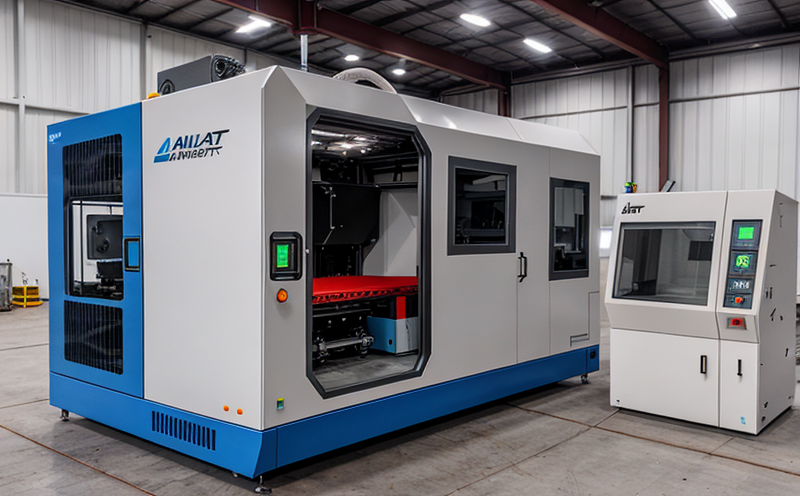ASTM F3524 Mechanical Property Testing of AM Plastics
The ASTM F3524 standard is a critical tool in the quality assurance and compliance process for additive manufacturing (AM) plastics. This standard provides detailed procedures for mechanical property testing, which are essential to ensure that parts manufactured through AM processes meet design specifications and perform reliably under various loading conditions.
ASTM F3524 specifically addresses the mechanical properties of thermoplastic materials used in selective laser sintering (SLS), fused deposition modeling (FDM), and other additive manufacturing techniques. The standard covers tensile, flexural, compressive, and impact strength tests, among others. These tests are crucial for understanding how a part will behave under typical operating conditions and stress scenarios.
The testing process involves several key steps: specimen preparation, calibration of test equipment, application of mechanical loads, and analysis of the resulting data. Specimen preparation is critical as it directly impacts the accuracy of the results. ASTM F3524 provides precise guidelines for this step to ensure consistency across different laboratories.
The standard specifies a range of testing parameters that must be adhered to for each type of test. For tensile tests, for instance, the specimen geometry is defined in detail, including dimensions and orientation relative to the direction of loading. Flexural tests follow similar guidelines but with specific bend angles and support conditions.
Compliance with ASTM F3524 ensures that parts meet not only internal quality control standards but also regulatory requirements. This compliance can be critical for industries such as aerospace, automotive, and medical devices where part integrity is paramount.
The ASTM F3524 standard is widely recognized internationally. It aligns with other relevant standards like ISO/TS 18790 and EN 376, which further enhances its credibility in the global market. This alignment ensures that results from tests conducted under this standard are accepted across different regions and industries.
Quality managers and compliance officers rely on ASTM F3524 to ensure that their AM parts meet strict quality standards. R&D engineers use it as a benchmark for material selection and process optimization. Procurement teams leverage the standard during supplier audits and part certification processes. The standard's reliability and precision make it indispensable in these roles.
The ASTM F3524 protocol is designed to be rigorous yet practical, ensuring that parts are tested under realistic conditions that simulate real-world usage. This approach not only enhances product performance but also minimizes the risk of failures due to material or process inconsistencies.
Why It Matters
The mechanical property testing outlined in ASTM F3524 is essential for ensuring the reliability and safety of parts manufactured through additive manufacturing. These tests provide critical data that help manufacturers make informed decisions about design, materials selection, and process optimization.
- Material Selection: Testing helps identify the optimal material for a given application by evaluating its mechanical properties under various conditions.
- Process Optimization: By understanding how different parameters affect the final product, manufacturers can refine their processes to produce parts with desired characteristics.
- Safety Assurance: Ensuring that parts meet stringent mechanical property standards reduces the risk of failures in critical applications like aerospace and medical devices.
The testing also plays a vital role in meeting regulatory requirements. Compliance with ASTM F3524 can be crucial for industries subject to strict quality controls, such as aerospace and automotive sectors.
In summary, ASTM F3524 mechanical property testing is not just a procedural requirement; it is an integral part of ensuring product reliability, safety, and compliance in the rapidly evolving field of additive manufacturing.
International Acceptance and Recognition
- ISO/TS 18790: This international standard for AM parts is closely aligned with ASTM F3524, ensuring compatibility in testing protocols and results across different regions.
- EN 376: The European equivalent of ASTM F3524, this standard ensures that AM parts meet the same rigorous mechanical property requirements recognized globally.
The widespread acceptance of these standards is a testament to their robustness and reliability. Laboratories that adhere to these protocols are trusted providers of high-quality testing services, ensuring that manufacturers can confidently rely on test results for critical applications.
International recognition extends beyond mere acceptance; it also encompasses the trust placed in laboratories that follow these standards. This reputation enhances market credibility and facilitates smoother global trade.
Competitive Advantage and Market Impact
- Innovation and Quality: Compliance with ASTM F3524 allows manufacturers to innovate while maintaining a high level of quality, which is essential for gaining competitive advantage.
- Customer Trust: Meeting stringent standards like those in ASTM F3524 builds trust among customers, leading to stronger market positions and increased sales.
The use of these standards can also help manufacturers navigate the complexities of international trade. By adhering to globally recognized protocols, companies ensure that their products meet all necessary regulatory requirements without additional hurdles or delays.
Moreover, compliance with ASTM F3524 can lead to cost savings in the long run by reducing the need for repeated testing and ensuring first-time quality assurance.





